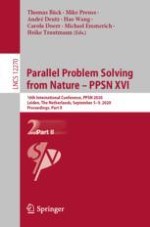2020 | OriginalPaper | Chapter
Hybridizing the 1/5-th Success Rule with Q-Learning for Controlling the Mutation Rate of an Evolutionary Algorithm
Authors : Arina Buzdalova, Carola Doerr, Anna Rodionova
Published in: Parallel Problem Solving from Nature – PPSN XVI
Publisher: Springer International Publishing
Activate our intelligent search to find suitable subject content or patents.
Select sections of text to find matching patents with Artificial Intelligence. powered by
Select sections of text to find additional relevant content using AI-assisted search. powered by
